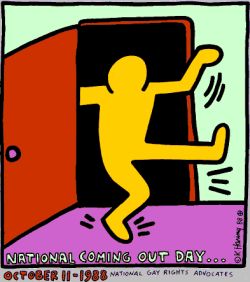International Coming Out Day on 11 October was established in the USA in 1988. Lars Bergmann, 28, is a coming-out helper and head of the coordination centre andersARTIG in Brandenburg. Axel Schock spoke to him about coming out in the age of the Internet, self-help in the provinces and young people's attitudes to HIV
Ten years ago, you were still coming out yourself. Now you support young people in this important phase of their lives and were on the board of the Lambda youth network in Berlin. How has the situation of gay young people changed during this time?
The social climate has undoubtedly improved and many things have become easier as a result. But there have also been structural changes. When I came out, for example, there were no internet platforms like Gayromeo. As a young person, you really had to storm out into the scene and come into direct contact with others. The first point of contact was usually the gay youth group. That definitely had a special charm and, looking back, I'm not sad that I experienced my coming out in this way. Today, the internet is of course a much lower-threshold way. It is more anonymous and provides a huge amount of information that didn't exist at the turn of the millennium.
Has this made coming out easier?
The fears and anxieties of young homosexuals are still the same: How will my parents react? Will my friends still want to be friends with me? The fear of being bullied and ostracised is particularly serious for young people because, at 16 or 18, they are at an age when they define themselves to a large extent through a clique or group. Being marginalised there is a double punishment.
We now have a gay foreign minister and gay marriage, and the social climate appears to be increasingly tolerant. However, surveys among young people in particular indicate the opposite trend. What experiences have you had in youth work?
It still very much depends on where you live your life. Berlin, for example, is not a benchmark for Germany. Time and time again, young people experience being thrown down the gauntlet because they are different. And in my opinion, this tendency is actually increasing. So the golden age for gays and lesbians is still a long way off, even if that's what the public perception is.
How do you react to this?
Lambda and AndersARTIG, for example, organise an annual tour through Brandenburg to encourage the rural population to engage with the topic of homosexuality. Compared to Berlin, for example, the level at which the topic is sometimes discussed can only be described as subterranean.
Is this mainly due to the urban-rural divide?
In Berlin, the image is often conveyed that everything has been achieved. However, we have recently seen that homophobia is also part of everyday life in a metropolis like Berlin. Politicians there have responded with the "Initiative for the Acceptance of Sexual Diversity". This may be exemplary, but it is by no means the norm throughout Germany. The state of Brandenburg, for example, has basically been providing funding at the same low level for 20 years and is surprised that no progress has been made. That is also part of reality.
What remains for lesbian and gay young people in small provincial towns - whether in Hesse, Bavaria or Brandenburg - in view of this social situation?
I think that many young people in rural areas wait until they are old enough to move to a larger city before coming out. There the anonymity is great enough or the climate is so open that they can dare to do so.
"Professionalised services for gay and lesbian young people are only available in large cities"
Then, of course, there are those who are brave enough to stay local and set up groups. Let's take Brandenburg as an example: there are active groups in Cottbus and Königs Wusterhausen and also a well-organised regional association in the Uckermark. Of course, none of this can be compared with the professionalised offerings of the big cities - but if they didn't exist, they would be sorely lacking.
What opportunities are there to promote these initiatives?
One of my tasks in Brandenburg is to help create and support such services and to develop infrastructures. In this way, we want to ensure that someone who comes out in Prignitz, for example, can get competent counselling locally. This might not be a gay and lesbian association, but an educational and family counselling centre instead. Unlike in city states such as Hamburg or Berlin, where everything is densely packed, in a large state like Brandenburg it's all about networking, especially in terms of expertise.
Young people today are generally confronted with sexuality at a much earlier age and more directly than ten years ago. Is this noticeable in your work?
In my opinion, the climate has only seemingly become more open; basically, we are dealing with the same inhibitions today. We notice this time and again when we are invited to educational events in school classes. You think that these tenth-graders are already completely hardened, but they barely manage to put the words for sexual practices into their mouths.
In your experience, what is the level of knowledge among young people about safer sex? Basically, all pupils should have rolled their first condom over a wooden penis in sex education lessons before coming out.
I find that the majority of gay young people are very well informed. They know how to protect themselves against HIV. Only a small group is completely ignorant. They have only learnt in sex education classes that condoms are good for preventing pregnancy. Beyond that, they have obviously not been reached by the sex education campaigns.
You also carry out so-called initial HIV counselling for young gay men.
Here, too, I experience that although the knowledge about safer sex is theoretically available, there are a thousand reasons why it is not practised in individual cases. The fear of a possible infection is then great afterwards. It is important to provide young men with good guidance on how to realistically assess their risk.
"If you put young people in fear of death, they are difficult to reach for education"
To what extent is gay coming out made more difficult by the fear of HIV?
The cliché image that gay men fuck around so much and therefore inevitably become infected with HIV is certainly no longer as prevalent as it used to be. This fear is often conveyed to young people by relatives and friends. I know this from my own coming out. My parents' first concern was that they would never have grandchildren. The second was that I might contract HIV. In this context, I keep realising what an antiquated image of the course of an HIV infection prevails. With good treatment, you no longer die within a few years!
It is sometimes criticised that the image of HIV in prevention is not sufficiently threatening.
If you put people in fear of death, they tend to close themselves off and are then no longer open to sex education. At Lambda, we have tried to counteract this - through safer sex workshops and general conversations about sexuality. That is the particular challenge: not to trivialise the infection, but also to take away this kind of fear of death. This is a difficult endeavour and also requires some educational experience. Unfortunately, this is not available everywhere.
Are some young people of the opinion that HIV cannot affect them because it is a matter for old gay men?
Such an attitude can be found latently again and again. I was actually asked several times by young people in group events at Lambda what the topic of HIV should have to do with them. They were under the misapprehension that of the 60 or 70 young people who come in and out of Lambda every day, not a single one was HIV-positive. In the meantime, however, younger people are increasingly realising that HIV doesn't just affect older people, partly because they are of course aware that some of their peers also go to so-called bareback parties. In Berlin, the guys from the prevention project manCheck have contributed a great deal to this change. They provide information about HIV and other sexually transmitted infections at parties and other trendy events. However, I can't say what the situation is like in rural areas.
"It is still difficult to talk about sexually transmitted diseases in youth work"
How do the young people react to your offers of dialogue?
In youth work, it is still difficult to talk about sexually transmitted infections and provide information about them. They are seen as a dirty matter that you have nothing to do with yourself. It starts with crabs and goes all the way to HIV.
How do young positives fare?
During my time at Lambda, there were a few people who dared to tell the others. But it is very difficult to be open about it. A young man who has been positive for two years explained this reticence to me: in his opinion, HIV is the only illness for which you are not pitied, but for which you are reproached: "Why didn't you pay more attention?" We will have to continue to work on this point.
How do you respond to this in terms of prevention?
Sex should first and foremost be fun. But warning young people about sex from morning to night can't be wise. The right thing to do is to convey that sex is fun, but that it also harbours risks. You have to deal with them before you expose yourself to them. That's what gay youth work needs to be about in addition to general coming-out support and I think that many projects have already found good educational concepts here.
Further information:
German internet presence of the Coming Out Day
I KNOW WHAT I AM DOING also offers information for young gays, for example Tips for newcomers to the big city scene
A good website for young gays is dbna.de. (dbna stands for "You are not alone")












